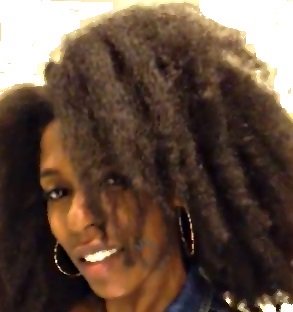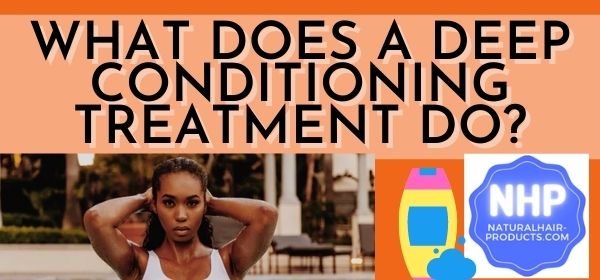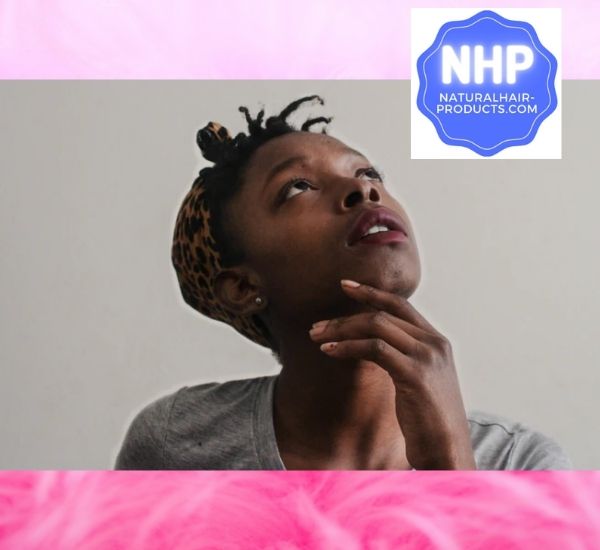What Does A Deep Conditioning Treatment Do? [NHP ANSWERS]
- NHP
- Type 4C Hair 101
- What Does a Deep Conditioning Treatment Do
What does a deep conditioning treatment do? Good question, my gorgeous NHP reader! The short and quick answer is:
A deep conditioning treatment does a nutrient-infusion conditioning job on hair cuticles and helps the scale-like cells to lie flat, which gives hair a smoother and shinier appearance.
Deep conditioner also does much to add moisture to your locks: One of the main reasons poorly-treated hair becomes unmanageable and lackluster is because it's been stripped of its hydration and moisture.
Now, let’s get down to the nitty-gritty and really break it down like a set of LEGOS…
Piece-by-hair-healing-piece… You see:
To truly understand what deep conditioning does for type 4C natural hair, you first need to understand what deep conditioning natural hair actually is.
Surprisingly, some folks who THINK THEY KNOW, got it all twisted like 2-strands, lol...
[RELATED ARTICLE: Best detangler for matted African-American hair]
What Does A Deep Conditioning Treatment Do? What It’s Designed To Do!
You know that a person truly doesn’t understand what deep conditioning natural hair really means when you hear questions like…”how to deep condition hair with regular conditioner?”
It’s OK though… Everybody starts somewhere.
True deep conditioning of natural hair implies the application of a thick and nutrient-rich restorative formula to your hair, oftentimes adding the power of steam or moist heat which is used to boost the inner-strand penetration of the conditioning formula into your hair.
What does a deep conditioning treatment do? The goal of a good deep conditioning session is to repair dry, damaged hair by rebuilding the hair’s molecular layer, topping up your hair’s nutrient level and replenishing growth-encouraging moisture.
After all is said and done, what a deep conditioning treatment does is encourage softer, stronger and revitalized hair. Whether you have type 4C hair or something else, the end goal is the same.
![What Does A Deep Conditioning Treatment Do? [NHP ANSWERS] What Does A Deep Conditioning Treatment Do? [NHP ANSWERS]](https://www.naturalhair-products.com/images/What-does-a-deep-conditioning-treatment-do.jpg) What Does A Deep Conditioning Treatment Do? [NHP ANSWERS]
What Does A Deep Conditioning Treatment Do? [NHP ANSWERS]What Does A Deep Conditioning Treatment Do? Boosts Length-Retention & 4C Hair Growth
Do you want to reach an attainable hair growth goal by the end of the year? Then you better let that premium deep conditioner treatment for natural hair work it’s magic. Whether it’s ready-made or DIY, just use it.
Because, look sis...
If you don’t add deep conditioning treatments to your 4C hair care regimen on a regular basis, then you probably won’t get the brilliant shine and hair growth that you dream of, unless you’re one of the few dang unicorn naturals who can neglect-the-crap-outta their hair and it still grows healthy and strong.
You know, the ladies that make you just wanna smack… a… kiss on their face?
For the rest of us mere mortals...
… it’s highly recommended that we do regular deep conditioning treatments, because without these hair-pampering treatments too many problems with tangling, knots, frizz, split-ends and breakage will be on our behinds like white on rice. Ugggghhh….
...not to mention problems with shifting hair color that is partly due to the hair’s lack of moisture and the abuse it takes.
Honestly, there are so many causes of hair damage that are out of our control. Which makes using a deep conditioning treatment that much more important.
Let’s talk about it...
Factors That Contribute to Hair Damage
What does a deep conditioning treatment do? It fights damage that is almost built-in to our everyday life.
Let’s take a quick look at the types of beating our natural 4C hair is regularly under so you can understand and appreciate why deep conditioning treatments are such a valuable weapon in a quest to healthy natural 4C hair even if you never self-inflict damage to your hair by using hair dye color, bleach or use heat styling tools like flat irons & curlers.
These Harm Hair No Matter What You Do:
- UV Rays
- Water (Yes, like in shampooing, frequent wetting or hard water)
- Heat Styling tools (hot combs, straightening irons, etc.)
- Manipulation (brushing, combing, detangling, styling)
- Weather (cold breeze, high or low temperatures, frost)
- Chemical treatments (Dye, bleach, relaxer, Keratin/Botox treatment)
- Salt or Chlorinated water
5 Answers For: “What Does A Deep Conditioning Treatment Do?”
So, let’s talk about some of the singular aspects of what your DIY deep conditioning treatments at home can do, same goes for the salon-trips and top-of-the-line deep conditioners the pros use on you.
Deep Conditioning Treatments Nourish Your Hair
Just like the rest of your body, your natural 4C hair requires nourishment to stay healthy.
Regular deep conditioning treatments provide your strands with these necessary nutrients. This nutrient replenishment is critically important because when hair is well nourished, it is at its strongest and more-suited for fast growth.
Deep Conditioning Treatments Moisturize 4C Natural Hair
Moisture and maximum hydration are vital keys to a healthy head of 4C hair. Deep conditioning treatments help to replace moisture lost from everyday wear and tear.
Without proper moisture maintenance, hair becomes dry and brittle, making it more prone to frizz, split-ends and nasty breakage.
Deep Conditioning Treatments Promotes Elasticity In Kinky 4C Hair
Dry, brittle hair snaps and breaks under tension, resulting in split ends and breakage. The healthier your natural 4C hair is, the more resistant it is to breakage.
Regular deep conditioning treatments for your 4C natural hair does so much more than improve its general appearance. It also helps keep your individual strands healthy and strong.
Hair that is deep conditioned regularly is more manageable, softer, less prone to breakage and frizz, and able to retain length. There’s no better time than now to treat your tresses to a little extra love!
Deep Conditioning Treatments Prevents Damage to Natural 4C Hair
Even if you don’t color or flat iron straighten your hair often, it is still susceptible to damage. Even the gentlest hair brush can cause breakage to the hair’s cuticle.
Though our natural hair is constantly under some form of external stress which makes it vulnerable to damage, the purpose of regular deep conditioning treatments for your locks is to allow the penetrating and healing ingredients in these products to soak in and enter the hair shaft.
Many high quality deep conditioners deliver needed proteins and nutrients to repair, strengthen, nourish and moisturize the hair which will not only help to prevent split ends and breakage but also help to rehabilitate damaged hair and prevent further damage.
A proper deep conditioning treatment repairs this damage by penetrating the hair shaft and forcing the cuticles to lie flat. And that’s not all – deep conditioning doesn’t just repair already damaged hair, it also prevents damage from happening in the future.
Deep Conditioning Treatments Reduce Split Ends
Deep conditioning can also help slow down the process of unhealthy split ends. We’ve all seen what split ends can do to hair and it looks a hot mess! Just embarrassing... If you don’t like to trim your hair very often then make sure you are deep conditioning regularly.
When you deep condition you strengthen the ends of your hair which are the oldest and weakest part of your hair. If you look after and strengthen the ends of the hair you can slow down the progress of split ends.
Unfortunately, we cannot fully keep split ends away forever so trimming your hair eventually is a must. Wouldn’t you just love to never have to deal with irritating split ends again?
Join NHP-HIVE and get sent our info-packed, down-to-earth & sometimes funny NHP hair tutorials by email. SIGN UP HERE...
How To Deep Condition 4C Hair
Deep conditioners should be used with heat, one option is to try microwaving a damp towel for 30–60 seconds. Check it at 30. If it’s steaming, it’s ready.
Put damp hair into one of those small shower caps (the kind you find in a hotel) and then put the hot towel on your hair and wrap it up. Put a thicker heavy duty shower cap of that and leave it on for 20 minutes.
What this deep conditioning treatment procedure does is it opens up the cuticle of the hair so that the deep conditioner can penetrate into the shaft of the hair and it leaves moisture, maybe a protein ingredient too, as well as ingredients that help it get shiny or smoother.
You leave it on till the towel cools off and then you let your hair cool off. Then you rinse the conditioner out really well (you don’t want to leave it in because it is thick and heavy for regular use).
What Does A Deep Conditioning Treatment Do When Bleaching or Coloring Hair?
Dyeing and bleaching natural hair strips out a lot of textile strength, as well as moisture and makes the hair cuticle more porous which could result in more split ends and MUCH dryer, more brittle hair.
If you haven’t deep conditioned your hair before dyeing or bleaching, wait at least 3 days (hopefully a week) before you do a deep conditioner to allow the dye to become part of the hair shaft.
If you deep condition dyed/bleached hair too soon, some of the hair dye and color will be pulled out of the hair and the color will go down the drain and ultimately cause a change in your hair color.
Also if you are using hot tools like flat irons, curling irons, blow dryers daily, then you need to be doing a deep conditioner probably every 2 weeks depending on the condition of your hair.
What To Do After Deep Conditioning Natural Hair?
The smart naturals among us not only find out what does a deep conditioning treatment do but what to do AFTER deep conditioning natural hair.
Whether you’re using a homemade deep conditioner for damaged hair or a premium beauty Moroccan oil hair masque, there are optimal steps to take after your deep condish session.
I wrote all about what to do afterward right here, take a look!
Follow Author of "What Does A Deep Conditioning Treatment Do?" Tutorial...

ABOUT THE AUTHOR: Melissa Lee
Melissa Lee is a Contributing Editor to NHP and a former owner of the BlackhairOMG website. She formed 4C Trichology Growth Services, LLC., a US based hair care consultation service. She has also contributed as a writer and consultant for various hair and beauty websites. Melissa can be followed on Twitter here.



